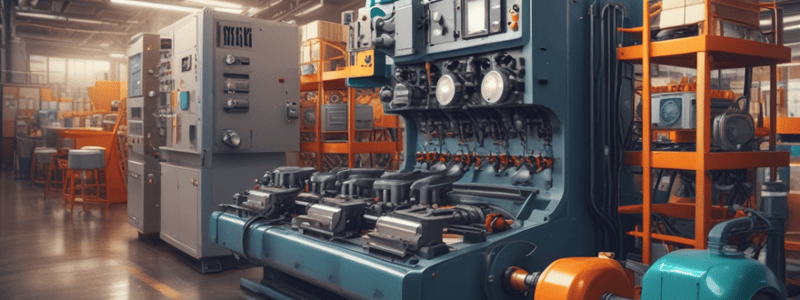Podcast
Questions and Answers
What is the primary objective of lean principles?
What is the primary objective of lean principles?
- Increasing production output without regard for efficiency
- Maximizing profits by reducing labor costs
- Outsourcing non-core activities to reduce operational costs
- Minimizing waste while maximizing customer value (correct)
What is the significance of processes in a manufacturing setting?
What is the significance of processes in a manufacturing setting?
- They are unnecessary and should be avoided for cost reduction
- They increase waste and reduce productivity
- They have no impact on manufacturing operations
- They ensure consistent product quality and efficient workflow (correct)
Which aspect is crucial for maintaining compliance with industry standards?
Which aspect is crucial for maintaining compliance with industry standards?
- Relying solely on outdated manufacturing methods
- Implementing well-defined processes and control plans (correct)
- Prioritizing cost-cutting over quality control measures
- Ignoring established protocols and regulations
What is the primary goal of quality control measures in manufacturing?
What is the primary goal of quality control measures in manufacturing?
Which of the following is NOT a benefit of implementing efficient processes?
Which of the following is NOT a benefit of implementing efficient processes?
What is the primary focus of continuous improvement efforts in manufacturing?
What is the primary focus of continuous improvement efforts in manufacturing?
What is the purpose of quality control?
What is the purpose of quality control?
Which organization sets out criteria for a quality management system?
Which organization sets out criteria for a quality management system?
What is a method for continuous improvement focusing on eliminating waste and improving workflows?
What is a method for continuous improvement focusing on eliminating waste and improving workflows?
In the context of quality control, what does SPC stand for?
In the context of quality control, what does SPC stand for?
Which technology enables real-time tracking of production processes in the manufacturing industry?
Which technology enables real-time tracking of production processes in the manufacturing industry?
What is the primary focus of efficiency improvements in business processes?
What is the primary focus of efficiency improvements in business processes?
Which industry-wide approach focuses on eliminating non-value adding activities and optimizing workflow?
Which industry-wide approach focuses on eliminating non-value adding activities and optimizing workflow?
What is the purpose of compliance standards in industries?
What is the purpose of compliance standards in industries?
'Six Sigma' aims to eliminate defects and reduce variability in what aspect of business processes?
'Six Sigma' aims to eliminate defects and reduce variability in what aspect of business processes?
What allows manufacturers to make necessary adjustments promptly for maintaining quality standards?
What allows manufacturers to make necessary adjustments promptly for maintaining quality standards?
Study Notes
Processes and Control Plans in Quality Control, Compliance Standards, Manufacturing Industry, and Efficiency Improvement
In various industries, processes and control plans play a crucial role in ensuring quality control, maintaining compliance with standards, enhancing efficiency, and sustaining continuous improvement. These elements have become essential components of modern operations, whether in large corporations or small businesses. In this discussion, we will delve deeper into these aspects and explore how they contribute to overall success in business.
Processes and their Importance
A process can be defined as a series of steps taken to achieve a specific outcome. In a production setting, it refers to the sequence of activities required to transform raw materials into finished products. Effective processes lead to efficient working conditions, reduced waste, enhanced productivity, and cost savings. When implemented correctly, processes can also ensure consistent product quality.
Explanation of Lean Principles
The lean principle is based on minimizing waste within the manufacturing system while simultaneously maximizing value from the end customer's perspective. It focuses on eliminating non-value adding activities and optimizing workflow to improve efficiency and reduce costs without compromising product quality.
Quality Control
Quality control is the systematic monitoring and evaluation of the procedures used to assure that products meet specified requirements. It involves establishing metrics that measure the performance of each step in a process, identifying opportunities for improvement, implementing changes, and verifying that changes were effective. This approach ensures that the entire organization operates according to predetermined quality objectives.
For instance, statistical process control (SPC), a method used for quality control, involves collecting data on random samples of a product and analyzing these statistics over time to identify trends that could indicate issues with the manufacturing process. By using this information, manufacturers can make necessary adjustments promptly to maintain quality standards.
Compliance Standards
Compliance standards refer to regulations and guidelines that industries must follow to ensure safety, ethical practices, and consistency across operations. They help protect consumers and establish credibility for businesses within their industry. For example, the International Organization for Standardization's (ISO) ISO 9001 series sets out the criteria for a quality management system, which can include processes involved in managing people, resources, and systems effectively.
Implementation of compliance standards requires careful planning, execution, monitoring, and improvement strategies. Organizations need to regularly review and update their internal policies, procedures, and records to maintain compliance with ever-evolving requirements.
Manufacturing Industry
Processes and control plans play a significant role in the manufacturing industry, where waste reduction, efficiency gains, and cost savings are paramount. Lean principles, for example, have become widely adopted in many industries due to their focus on eliminating non-value adding activities and optimizing workflow. This approach contributes to reduced costs, increased productivity, and improved customer satisfaction by delivering high-quality products on time.
Moreover, technology integration is another vital aspect of modern manufacturing. Advanced technologies such as automation, artificial intelligence, and internet of things (IoT) sensors enable real-time tracking of production processes, allowing for immediate detection and correction of deviations from desired performance levels.
Efficiency Improvement
Efficiency improvements involve making existing processes perform better, consuming fewer resources, and producing more value. One common method for achieving this goal is Kaizen, an ongoing process of continuous improvement that focuses on eliminating waste and improving workflows. By identifying areas for improvement and implementing changes, organizations can achieve incremental enhancements in efficiency over time.
Another strategy is Six Sigma, a disciplined, data-driven approach to eliminate defects and reduce variability in business processes. By applying statistical methods, Six Sigma practitioners aim to develop more predictable processes and improve overall performance.
Conclusion
Processes and control plans serve essential functions in various aspects of business operations, from maintaining quality control and ensuring compliance standards to streamlining manufacturing processes and fostering efficiency improvements. By understanding and leveraging these elements, companies can stay competitive in their respective markets while providing better services and products to customers.
Studying That Suits You
Use AI to generate personalized quizzes and flashcards to suit your learning preferences.
Description
Explore the importance of processes, lean principles, quality control, compliance standards, and efficiency improvement in the manufacturing industry. Learn about how these elements contribute to quality assurance, waste reduction, cost savings, and overall operational efficiency.




